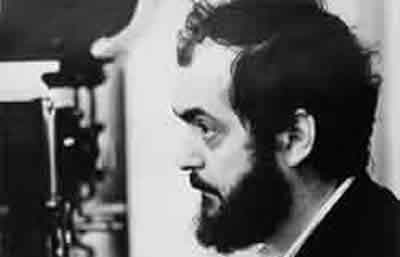

Stanley Kubrick on the set of 2001: A Space Odyssey |
Born July 26, 1928 in New York City, New York, Stanley Kubrick was quite possibly the best, most innovative, and challenging director in American cinema during his lifetime. At a young age Kubrick was fascinated with the arts, particularly still photography and jazz music. As a teenager, he aspired to be a photographer, as well as a jazz drummer. He graduated high school with poor grades and could not be admitted to secondary school, but found employment working as a photographer for Look magazine. This exposed him to filmmaking, with which he became enamored. In 1951, Kubrick began shooting documentary shorts, and in 1953 he released his first feature film, Fear And Desire. He then went on to a sporadic, yet productive career and made some of the most artistically innovative and culturally defining films in cinematic history. They include; Spartacus (1960), Lolita (1962), Dr. Strangelove (1963), 2001: A Space Odyssey (1968), A Clockwork Orange (1971), The Shining (1980), Full Metal Jacket (1987), and Eyes Wide Shut (1999).
Due to the ambiguous nature of his films, as well as seeming ambiguous himself, Kubrick was thought to be cold, miserly, and reclusive. Since his death in 1999, many friends and associates have attempted to disspell such assumptions by noting his inquisitive, realistic nature for his apparent coldness. Stanley was demanding on the set of a movie, but he was this way because he wanted to create his vision as best he could. Many deemed him self-indulgent, but in his defense, he simply wanted to capture the human condition as truthfully as possible. This required the utmost amount of discipline and attention to deail, for life, in his eyes, is infinitely detailed and cannot be understood through rash generalizations. At times though, his focus did indeed make him insular and hard to understand. This is certainly reflected in his films. Kubrick always attacked the grey areas, thus frustrating many viewers, critics, and actors. Many actors felt he did not allow for enough creative freedom, and was too preoccupied with meaningless detail, making them instruments in his orchestra, not looking at them as individual artists as well. That said, as meticulous, controversial, and undeniably provocative as every Kubrick film is, it is hard to argue with his method. Each of his films push the envelope by posing staggering philosophical, social, and cultural dilemmas. Kubrick regarded his art in this way. "I would not think of quarreling with your interpretation nor offering any other, as I have found it always the best policy to allow the film to speak for itself".